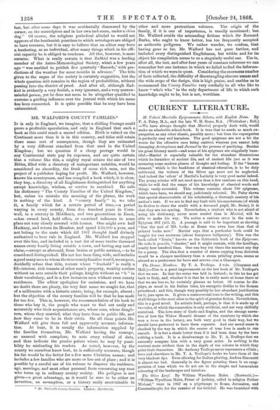MR. WALFORD'S COUNTY FAMILIES.*
iv is only in England, we imagine, that a shilling Peerage could prove a profitable speculation, and only in England that such a book as this could reach a second edition. Birth is valued on the Continent more than it is in this country, and titles still retain there some sort of consequence, though they are estimated by a very different standard from that used in the United Kingdom ; but we question if a cheap peerage would in any Continental state pay its expenses, and are quite certain that a volume like this, a mighty royal octavo the size of two Bibles, filled with a directory of unimportant notables, would be -considered an absurdity, the freak of some rich man, not the project of a publisher hoping for profit. Mr. Walford, however, knows his countrymen, and has compiled a book which, it is clear, they buy, a directory of all Englishmen distinguished for anything -except knowledge, wisdom, or service to mankind. He calls his dictionary " The County Families of the United Kingdom," but, unless we mistake the meaning of the phrase, the work is nothing of the kind. A " county family " is, we take it, a family which for a certain period of time,—a period varying in every county, from five hundred years in Corn- wall, to a century in Middlesex, and two generations in Essex, —has owned land, held office, or exercised influence in some place not very closely covered with houses. One might own half Hackney, and return its Member, and spend £30,000 a year, and not belong to the caste which till 1867 thought itself divinely authorized to bear rule in England. Mr. Walford has stepped over this line, and included in a vast list of some twelve thousand names every family living outside a town, and having any sort of -claim,—except as aforesaid, from brains or public services,—to be considered distinguished. His net has been flung wide, and includes -a good many men to whom the true county families would, we suspect, decidedly refuse that title, rectors whose " freehold" is really a life-interest, rich tenants of other men's property, wealthy settlers without an acre outside their palings, knights without an " h " in their vocabulary, and in a few instances men without even county residences. The editor apologizes for omissions, and we have mo doubt there are plenty, the very first name we sought for, that of a millionaire with a historic estate, being, for example, absent ; but the objection of the county families will be that he has made far too few. This is, however, the recommendation of his book to those who buy it, the people who want to find out easily and accurately who their acquaintances are, whose sons, whose daugh- ters, whom they married, what they have done in public life, and low they came to be in their circle. On all these points Mr. Walford will give them full and apparently accurate informa- tion. At least, it is usually the information supplied by the families themselves, Mr. Walford having the courage, so unusual with compilers, to note every refusal of data, and thus indicate the precise points where he may by possi- bility be misleading his readers. As tested, however, by the county we ourselves know best, he is sufficiently accurate, though his list would be the better for a few more Christian names ; and includes a few families who are more or less out of place ; and it is possible by a careful use of his volume to discover the residence, age, marriage, and most other personal facts concerning any man who turns up in ordinary county society. Ills pedigree is not given—a great advantage, as it would be sure to be either an invention, an assumption, or a history easily ascertainable in ' Mr. 3ral fords County Families. andon: Hardwick°. other and more pretentious volumes. The origin of the family, if it is one of importance, is usually mentioned ; but Mr. Walford avoids the astounding fictions which Sir Bernard Burke, who ought to know better, has too frequently accepted as authentic pedigrees. We rather wonder, we confess, that having gone so far, Mr. Walford has not gone farther, and included every distinguished Englishman, but within and for its object his compilation seems to us a singularly useful one. Use is, after all, the test, and after four years of constant reference we can remember but one instance in which we failed to find the informa- tion of which we were in quest. Considering the enormous number of facts collected, the difficulty of disentangling obscure names and the wide scope of the design, this is high praise, and enables us to recommend the County Families very cordially to all who like to know "who's who" in the only department of life in which such knowledge ought to be, but is not, worthless.


































 Previous page
Previous page